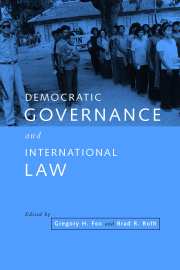Book contents
- Frontmatter
- Contents
- List of contributors
- List of acknowledgments
- Introduction: the spread of liberal democracy and its implications for international law
- PART I THE NORMATIVE FOUNDATIONS OF A RIGHT TO POLITICAL PARTICIPATION
- PART II DEMOCRACY AND INTER-STATE RELATIONS
- PART III DEMOCRACY AND THE USE OF FORCE
- PART IV DEMOCRATIZATION AND CONFLICTING IMPERATIVES
- PART V CRITICAL APPROACHES
- Index
Introduction: the spread of liberal democracy and its implications for international law
Published online by Cambridge University Press: 04 May 2010
- Frontmatter
- Contents
- List of contributors
- List of acknowledgments
- Introduction: the spread of liberal democracy and its implications for international law
- PART I THE NORMATIVE FOUNDATIONS OF A RIGHT TO POLITICAL PARTICIPATION
- PART II DEMOCRACY AND INTER-STATE RELATIONS
- PART III DEMOCRACY AND THE USE OF FORCE
- PART IV DEMOCRATIZATION AND CONFLICTING IMPERATIVES
- PART V CRITICAL APPROACHES
- Index
Summary
DEMOCRATIC GOVERNANCE AND INTERNATIONAL LAW
Prior to the events of 1989–91, “democracy” was a word rarely found in the writings of international lawyers. Most scholars, and certainly most States, accepted the 1987 view of the American Law Institute that “international law does not generally address domestic constitutional issues, such as how a national government is formed.” Apart from its use in resolutions repudiating “alien, colonial, and racist” domination, the term “democratic” appeared in collective pronouncements as a mere platitude, so abstract as to encompass opposite interpretations. Although human rights instruments such as the International Covenant on Civil and Political Rights (ICCPR) had long provided for a right to political participation, the diversity (and, in the case of Cold War participants, mutual hostility) of governmental systems in the international “community” had precluded consensus on the specifications of this right. Moreover, any assertion of a determinate “right to democratic governance” would have suggested criteria of governmental legitimacy at odds with the “effective control” doctrine that had long prevailed in the recognition practices of most States and intergovernmental organizations.
The United Nations, an organization founded on the principle of the sovereign equality of ideologically diverse States, seemed an unlikely vehicle to further a specific mode of internal governance. Although the UN had an extensive history of monitoring elections and referenda in States emerging from colonialism, it did not send a monitoring mission to a sovereign State until the 1990 elections in Nicaragua.
- Type
- Chapter
- Information
- Democratic Governance and International Law , pp. 1 - 22Publisher: Cambridge University PressPrint publication year: 2000
- 3
- Cited by



